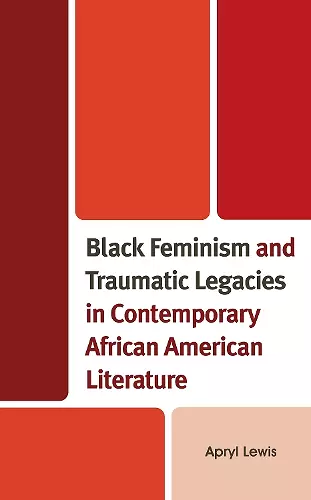Black Feminism and Traumatic Legacies in Contemporary African American Literature
Format:Hardback
Publisher:Bloomsbury Publishing PLC
Published:15th Feb '23
Currently unavailable, and unfortunately no date known when it will be back

Black Feminism and Traumatic Legacies in Contemporary African American Literature employs an analysis of select African American novels and applies trauma studies and Black Feminist Studies to explain the significance of trauma and traumatic experiences that stem from slavery and how this advances scholarly discussions about African American literature. Using the crooked room theory from Melissa Harris-Perry’s Sister Citizen (2011), the author argues that the traumatic legacy of slavery is the “crooked room” that African Americans, especially Black women, are forced to navigate to facilitate healing. Much like trauma, healing is not a linear concept, and healing is more about reclaiming oneself in the aftermath of traumatic experiences. An intersectional approach facilitated by Black Feminist Studies is pivotal for uplifting the traumatic experiences of African Americans, especially women, that does justice to their specific histories. Although slavery is pushed out of public awareness because of people who are uncomfortable with confronting slavery’s traumatic magnitude on the Black community, African American literature is not removed from discussing past and present traumas that are pervasive in the Black community.
Apryl Lewis’s Black Feminism and Traumatic Legacies in Contemporary African American Literature examines the works of Yaa Gyasi, Tayari Jones, Jesmyn Ward, and Colson Whitehead in order discuss how bodily autonomy and reclamation of the self is possible in the face of mass incarceration, slavery and other traumas visited on black bodies through the ages. Lewis methodically sifts through these novels to unpack intergenerational trauma and catharsis in order to conjure up a healing for her readership. Black Feminism and Traumatic Legacies is important for its much-needed intersectional approach to the field of trauma studies. -- Kimberly Nichele Brown, author of "Writing the Black Revolutionary Diva: Women’s Subjectivity and the Decolonizing Text"
Making incisive and important points, Apryl Lewis lucidly explores the myriad ripple effects of shame in African American and postcolonial history as represented by two gendered dimensions of trauma: what is imprinted and what is erased. -- Alan Nadel, author of "Invisible Criticism: Ralph Ellison and the American Canon" and "The Theatre of August Wilson"
Lewis’s discussion of how four Black authors cause readers to contemplate and, more importantly, confront the ongoing trauma of slavery is an essential consideration for scholars of American Literature today. By identifying “crooked room”-thinking in this literature, Lewis shows how Black women in the United States constantly compromise their personhood. Such realizations and others that Lewis offers in this work are crucial for achieving social change. -- Elissa Zellinger, Texas Tech University
Writing with both academic authority and personal candor, Apryl Lewis juxtaposes Black feminist scholarship and trauma studies to explain white supremacy and misogyny’s ongoing violence—especially against Black women. While Lewis is incisive in naming these threats and exploring their effects in both expansive and intimate contexts, this work is also ultimately hopeful for showing the various ways that contemporary African American literature provides vital healing and redress. -- Michael Borshuk, Texas Tech University
ISBN: 9781666921380
Dimensions: 240mm x 156mm x 18mm
Weight: 431g
158 pages